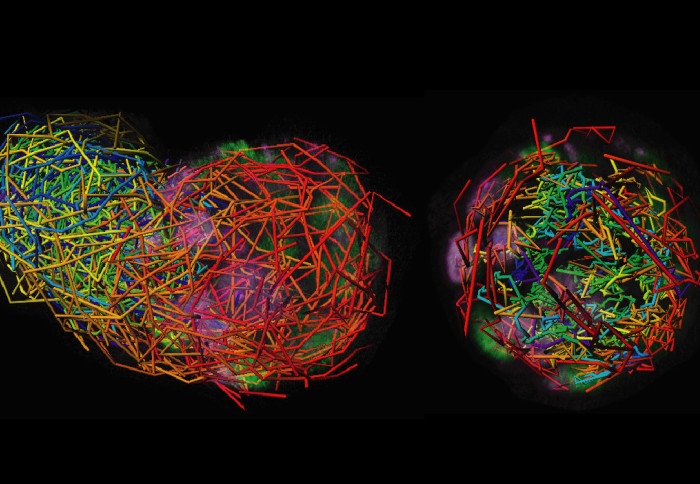Partnership between Imperial and Leica to improve precision biomedical imaging
by Helen Wilkes

Track displacement of individual cells from a 4-cell stage mouse pre-implantation embryo
Leica and Imperial will soon launch a dedicated biomedical imaging hub at Imperial focusing on complex dynamics in biological systems.
The Leica and Imperial Imaging Hub will be based at Imperial College London’s White City and South Kensington Campuses and will provide advanced, efficient systems for biomedical imaging that will bring together expertise from across the scientific community.
The Hub will also serve as a platform for Imperial and Leica Microsystems to maintain a close dialogue on the value of microscopy in development and research applications, as well as to collaborate on joint research projects.
Dr Periklis Pantazis, Reader in Advanced Optical Precision Imaging at Imperial’s Department of Bioengineering, and Eddie McGuigan, Head of Microscopy Sales, Leica Microsystems (UK) Ltd, said: “We are delighted to see that our initial discussions have resulted in this really exciting partnership. We are very much looking forward to working together to drive scientific discoveries benefitting human health. The Leica and Imperial Imaging Hub is the ideal setup to make this happen.”
Focussing on health
Equipped with cutting-edge confocal and widefield microscopy systems, the Hub will focus on understanding biological systems to advance human health by exploring probes, molecular agents to visualise, quantify and manipulate a cell or organism; imaging modalities, equipment and methodologies used to acquire images from the molecular scale to tissue scale of the human body; and software, computer programmes that process the data produced.
The interplay between these factors is what allows researchers to obtain an accurate visual display of complex dynamics in biological systems. The Hub will combine these factors in one place, generating a unique environment that will establish an effective acquisition and interpretation workflow and facilitate innovation and development across disciplines and communities of experts.
Professor Anthony Bull, Head of Imperial’s Department of Bioengineering, said: “We are thrilled to announce this partnership with Leica Microsystems. The Imaging Hub will bring together the incredible imaging capabilities of Leica’s instruments with our world-leading academic researchers to allow specialised investigations using the latest and greatest technologies.”
Looking to the future
One of the long term aims is for researchers at the Hub to use optical precision imaging in monitoring and predicting response to medical treatments. In addition to the potential medical advantages of the Hub, its technology and collaborations will benefit both the industry and the academic community alike by technology transfer and training.
Markus Lusser, President at Leica Microsystems, said: “Leica Microsystems’s 170-year history and our success are based on partnerships with some of the world’s leading academic institutions. We are proud to form this new partnership with Imperial College London that will allow us to develop and test new technologies and applications in close collaboration. Our collaborators get early access to breakthrough innovations, to drive progress in science while we collect valuable feedback for our technology development cycle. This is a true win-win situation for Imperial and Leica Microsystems.”
The Hub will be launched later in 2021.
Article text (excluding photos or graphics) © Imperial College London.
Photos and graphics subject to third party copyright used with permission or © Imperial College London.
Reporter
Helen Wilkes
Faculty of Engineering